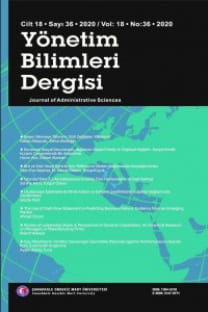The Effect of Managers’ Indigo Leadership Styles on Employers’ Job-Related Affective Well-Being
Indigo leadership, leadership, emotional well-being
THE EFFECT OF MANAGERS’ INDIGO LEADERSHIP STYLES ON EMPLOYERS’ JOB-RELATED AFFECTIVE WELL-BEING
Indigo leadership, leadership, emotional well-being,
___
- Akbaş, T. A. and Boylu, Y. (2016). “Algılanan Örgütsel Destek ve İşe İlişkin Duyuşsal İyi Oluş Halinin Üretkenlik Karşıtı İş Davranışları Üzerine Etkileri: Hizmet Sektöründe Bir Araştırma”, Journal of Business Research-Türk (İşletme Araştırmaları Dergisi), 8(4), 505-521.
- Aslantaş, C. and Dursun, M. (2008). "Etik Liderlik Davranışının Yöneticiye Duyulan Güven ve Psikolojik Güçlendirme Üzerindeki Etkisinde Etkileşim Adaletinin Dolaylı Rolü", Anadolu Üniversitesi Sosyal Bilimler Dergisi, 8(1), 111-128.
- Aytaç, S. (2006). “Çalışanların İşlerine İlişkin Duygularının Stres Tepkileri Üzerine Etkisi”, İstanbul Üniversitesi İktisat Fakültesi Mecmuası, İstanbul, 51(1), 833-851.
- Bayram, N., Aytaç, S., Bilgel, N. and Kuşdil, M. E. (2004). “İşe İlişkin Duyuşsal İyilik Algısı Ölçeğinin JOB-Related Affective Well-Being - Jaws Türkçe Versiyonunun Güvenirlik Çalışması”, Marmara Üniversitesi Sosyal Bilimler Enstitüsü Dergisi, 6(22), 1-7.
- Budak, G. and Fettahlıoğlu, Ö. O. (2015). "İndigo Liderlik ve İndigo Liderlik Ölçeği", The International Journal of Business & Management, 3(6), 176-185.
- Carroll, L. and Tober, J. (2012). İndigo Çocuklar Yeni Çocuklar Geldiler, S. Ayanbaşı (Çev.) İstanbul, Türkiye, Akaşa Yayınları.
- Çelik, M. Turunç, Ö. and Bilgin, N. (2015). “Çalışanların Örgütsel Adalet Algılarının Psikolojik Sermaye Üzerine Etkisi: Çalışanların İyilik Halinin Düzenleyici Rolü”, DEÜ SBE Dergisi, 16(4) 559-585.
- Daniels, K. (2000). “Measures Of Five Aspects Of Affective Well-Being At Work”, Human Relations, 53(2).
- Doğan, S. and Karataş, A. (2011). "Örgütsel etiğin Çalışan Memnuniyetine Etkisi Üzerine Bir Araştırma" Erciyes Üniversitesi İktisadi ve İdari Bilimler Fakültesi Dergisi, 2(37), 1-40.
- Durukan, G. (2013). “Liderlik Yaklaşımları Algısının İşe İlişkin Duygusal İyilik Durumu Üzerine Etkisi”, Yüksek Lisan Tezi, Marmara Üniversitesi Sosyal Bilimler Enstitüsü İşletme Anabilim Dalı Yönetim Ve Organizasyon Bilim Dalı.
- Edizler, G. (2010). "Karizmatik Liderlikte Duygusal Zeka Boyutuyla Cinsiyet Faktörüne ilişkin Literatürsel Bir Çalışma", Selçuk İletişim Dergisi, 6(2) 137-150.
- Erben, G. S. and Ötken, A. B. (2014). “Paternalist Liderlik Ve İşe İlişkin İyilik İlişkisinde İş-Yaşam Dengesinin Rolü”, Yönetim ve Ekonomi Araştırmaları Dergisi, 22, 103-121.
- Erdoğan, İ. (2007). İşletmelerde Davranış, İstanbul, Türkiye, İ.Ü.İ.F. Yayınları.
- Gökben Çetin, N. and Beceren, (2007). E. "Lider Kişilik: Gandhi", Süleyman Demirel Üniversitesi Sosyal Bilimler Enstitüsü Dergisi, 3(5), 110-132.
- Güdü Demirbulat, Ö. and Bozok, D. (2015). “Presenteeism (İşte Varolamama) ile Yaşam Doyumu, Fiziksel ve Ruhsal İyilik Halinin Etkileşimine Yönelik Seyahat Acentası İşgörenleri Üzerinde Bir Araştırma”, KMÜ Sosyal ve Ekonomik Araştırmalar Dergisi 16(27), 7-13.
- Gülertekin, S. (2013). "Duygu İklimi ve Liderlik Tarzının İşten Ayrılma Niyetine Etkileri: Alanya’daki Turizm İşletmelerine Yönelik Bir Araştırma" Yüksek Lisans Tezi, Çanakkale Onsekiz Mart Üniversitesi Sosyal Bilimler Enstitüsü.
- Karaarslan, M. (2004). "Yeni Dünyanın Çocukları: İndigo ve Kristal Çocuklar", Üçüncügöz Dergisi, http://aybuder.org/wp/download/_ndigo_ve_Kristal_Dosyas_.pdf (acessed February 15, 2018).
- Katwyk Van, P. T., Fox, S., Spector, P. E. and Kelloway, K. (2000). “Using The Job- Related Affective Well-Being To Investigate Affective Responses To Work Stressors”, Journal Of Occupational Health Psychology, 5(2), 219-230.
- Kayış, A. (2010). “Güvenilirlik Analizi”, Ş. Kalaycı. SPSS Uygulamalı Çok Değişkenli İstatistik Teknikleri içinde (404-409), Ankara, Asli Yayın Dağıtım.
- Kinter, O. (2016). Örtük liderlik Kuramı Çerçevesinde Güç Mesafesi İle Dönüşümcü ve Etkileşimci Liderlik İlişkisi, Yüksek Lisans Tezi, Balıkesir Üniversitesi.
- Koçel, T. (2014). İşletme Yöneticiliği, İstanbul, Türkiye, Beta Yayınları.
- Layard, R. (2005). Happiness: Lessons From A New Science. New York, Penguin.
- Mäntylä, O., Uusiautti, S. and Määttä, K.(2012). “Critical Viewpoint to Early Childhood Education Teachers´ Well-being at Work”, International Journal of Human Sciences, 9(1), 458-483.
- Özarallı, N. (2015). “Örgüt Kültürü ve İşe İlişkin Duygusal İyilik Algısının Çalışanların Çatışma Çözümü Tarzları Üzerindeki Etkisi”, Journal of Business Research-Türk (İşletme Araştırmaları Dergisi, 7(2), 7-37.
- Özmen, H. İ. (2009).Liderlik Davranışlarını Etkileyen Toplumsal Normların Analizi, Yüksek Lisans Tezi, Süleyman Demirel Üniversitesi.
- Polat, M. and Akdoğan, Z. (2017). "İndigo Liderlik Davranışlarının Örgütsel Vatandaşlık Üzerine Etkisi", International Journal of Dıscıplınes Economics & Administrative Sciences Studies, 3(1), 38-47.
- Seligman, M. E. P., (2002). Authentic Happiness. New York, Free Press.
- Seymen, B. and Seymen, A. (2003). "Örgütlerde İş Etiğinin Yerleştirilmesinde "Dönüşümcü Liderlik Tarzı"nın Etkileri Üzerine Bir Değerlendirme", Sosyal Bilimler Dergisi, 59-85.
- Şimşek, Ş., Akgemci, T. and Çelik, A (1998). Davranış Bilimlerine Giriş ve Örgütlerde Davranış, Ankara, Türkiye, Gazi Kitabevi.
- Tuncer, D., Yaşar Ayhan, D. and Varoğlu, D. (2016). Genel işletmecilik Bilgileri, Ankara, Türkiye, Siyasal Kitabevi.
- Uğurluoğlu, Ö. and Çelik, Y. (2009). "Örgütlerde Stratejik Liderlik ve Özellikleri" Hacettepe Sağlık İdaresi Dergisi, 12(2), 121-156.
- Ünal, Z. M. (2014). “Influence of Leaders Humor Styles on the Employees Job Related Affective Well-Being”, International Journal of Academic Research in Accounting, Finance and Management Sciences, 4(1), 201–211.
- Zel, U. (2001). Kişilik ve Liderlik, Ankara, Türkiye, Seçkin Yayıncılık.
- Werner, I. (1993). Liderlik ve Yönetim, V. Üner (Çev), İstanbul, Türkiye, Rota Yayınları.
- Warr, P. Work, (1987). Unemployment, and Mental Health, Oxford, Oxford University Press.
- Warr, P. (1990). “The Measurement of Ell-Being And Other Aspects Of Mental Health”, Journal of Occupational Psychology, 63. 193-210.
- ISSN: 1304-5318
- Yayın Aralığı: 4
- Başlangıç: 2003
- Yayıncı: Yönetim Bilimleri Dergisi
ENDÜSTRİ ÖZELLIKLERİNİN ÖRGÜT KÜLTÜRÜ ÜZERİNE ETKİLERİ: HİPOTETİK BİR ÇALIŞMA
Düşünme İhtiyacı – Ustalık Yönelimi- Psikolojik İyi Oluş İlişkisi: Eğitimciler Üzerinde Bir İnceleme
Ali ALPARSLAN, Ahmet Sait ÖZKUL, Tuğba ERHAN
Öğretim Elemanlarının Uzaktan Muhasebe Eğitimine Yaklaşımını Belirlemeye Yönelik Bir Araştırma
The Effect of Managers’ Indigo Leadership Styles on Employers’ Job-Related Affective Well-Being
Muhammet Hamdi MÜCEVHER, Ramazan ERDEM, Fatma TAŞ, Ömer Lütfi ANTALYALI
Alternatif Veri Elde Yöntemi Web Madenciliği: Otel Oda Fiyatlarının Zamansal Analizi
The Effects of Industry Characteristics on Organizational Culture
İşe Bağlı Stres ve Bireysel Güçlü Yönlerin Psikolojik İyi Oluş Üzerine Etkileri
